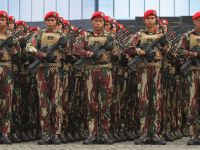The Syrian air force bombarded an area northeast of Damascus Monday, a day after an airstrike on the rebel-held district killed 100 people, an activist group said.
Sunday’s airstrike on Douma, 15 kilometers northeast of Damascus, was one of the bloodiest attacks of its type in the four-year-long war that has killed an estimated quarter of a million people and driven ten million from their homes.
A Syrian opposition group, the National Coalition for Syrian Revolutionary and Opposition Forces, said the attack aimed to inflict as many civilian casualties as possible. The dead included children.
“Any talk of political and peaceful solutions in the shadow of massacres and excusing the criminal from punishment will have no meaning in realizing stability in Syria,” Khaled Khoja, president of the Turkey-based coalition, said.
A United Nations commission of inquiry into the Syrian war has previously accused the government of indiscriminate shelling and aerial bombardment, including the use of barrel bombs regularly dropped on crowded areas.
A Syrian military source said the air force attacks Sunday on Douma and the nearby area of Harasta targeted an insurgent group, Islam Army, and were a response to attacks on nearby government-held areas.
The Syrian Observatory for Human Rights reported that at least 96 people were killed. After rescue workers arrived following an initial attack, the warplanes bombed the area again.
Rescue workers said 95 bodies had been identified and a further nine victims had yet to be named.
The Observatory gave no details of casualties in Monday’s airstrikes.
UN officials condemned the attack. UN envoy Staffan de Mistura said “hitting crowded civilian markets killing almost 100 of its own citizens by a government is unacceptable in any circumstances.”
The attack followed “the indiscriminate shelling of Damascus last week by armed opposition groups and the cutting of water supplies, all measures which affect civilians and are also unacceptable,” a U.N. statement said.
The UN humanitarian chief Stephen O’Brien said he is “horrified” by the attacks on civilians that are taking place in Syria, warning that the protracted conflict not only “severely affects” the lives of millions of people in the country but also threatens the stability of the entire region.
O’Brien told reporters that “attacks on civilians are unlawful, unacceptable and must stop.” O’Brien spoke in Damascus Monday at the end of a three-day visit to Syria, during which he met senior officials and visited the central province of Homs.
The US condemned the attack and insisted President Bashar Assad must go. “As we have said, Assad has no legitimacy to lead the Syrian people,” State Department spokesman John Kirby said, in a statement to reporters.
Kirby said Washington and its allies want a “political transition away from Assad that brings an end to such attacks and leads to a future that fulfills Syrians’ aspirations for freedom and dignity.”
The UN Security Council Monday backed a new push for peace talks in Syria adopted by Russia and the other 14 member states, despite reservations from Venezuela. It was the first time in two years that the council agreed on a political statement on Syria, which French Deputy Ambassador Alexis Lamek described as “historic.”
Venezuela, which has friendly relations with Syria, said it was disassociating itself from parts of the statement calling for a political transition to end the four-year war.
Caracas envoy Rafael Ramirez said the council was setting “a very dangerous precedent” by supporting a transition that he said violated Syria’s right to self-determination.
The council demanded that all sides work for a an end to the war by “launching a Syrian-led political process leading to a political transition that meets the legitimate aspirations of the Syrian people.”
The transition includes “the establishment of an inclusive transitional governing body with full executive powers, which shall be formed on the basis of mutual consent while ensuring continuity of governmental institutions.”
The council expressed “grave alarm that the Syria crisis has become the largest humanitarian emergency crisis in the world today,” with at least 250,000 dead and 12 million people forced to flee their homes.








